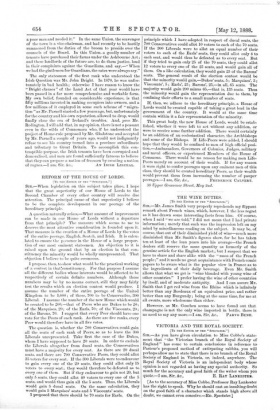REFORM OF THE HOUSE OF LORDS.
[To THE _EDITOR OF THE "SPECTATOR."]
Sin,—When legislation on this subject takes place, I hope that the great superiority of our House of Lords to the Second Chamber of every other country will receive due attention. The principal cause of that superiority I believe to be the complete development in our peerage of the hereditary principle.
A question naturally arises,—What amount of improvement can be made in our House of Lords without a departure from that principle? The measure which seems to me to deserve the most attentive consideration is founded upon it. That measure is the creation of a House of Lords by the votes of the entire peerage, English, Scotch, and Irish. It is calcu- lated to ensure the presence in the House of a large propor- tion of our most eminent statesmen. An objection to it is raised upon the ground that by an election in that con- stituency the minority would be wholly unrepresented. That objection I believe to be quite erroneous.
I propose, then, to show what would be the practical working of a contest in that:constituency. For that purpose I assume all the different bodies whose interests would be affected to be respectively of certain definite numbers. Although those numbers may be by no means correct, still they may fairly test the results which an election contest would produce. I assume the number of the entire peerage of the United Kingdom to be 1,000; of these, 700 to be Conservative, 300 Liberal. I assume the number of the new House which would be created to be 200,—that of Peers who are Dukes to be 20; of the Marquises, 20; of the Earls, 70; of the Viscounts, 20; of the Barons, 70. I suggest that every Peer should have one vote for the Peers of each rank. As there are five ranks, every Peer would therefore have in all five votes.
The question is, whether the 700 Conservatives could gain all the seats of each rank of Peers, so as to leave the 300 Liberals unrepresented. Take first the case of the Dukes, whom I have supposed to have 20 seats. In order to exclude the Liberals altogether from ducal seats, the Conservatives must have a majority for every seat. As there are 20 ducal seats, and there are 700 Conservative Peers, they could allot 35 voters for every seat. If the 300 Liberals were to endeavour to gain every one of the 20 seats, they could allot only 15 voters to every seat; they would therefore be defeated as to every one of them. But if they endeavour to gain not 20, but only 5 seats, they could allot 40 voters to every one of the 5 seats, and would thus gain all the 5 seats. Thus, the Liberals would gain 5 ducal seats. On the same calculation, they would gain 5 Marquises' seats and 5 Viscounts' seats.
I proposed that there should be 70 seats for Earls. On the
principle which I have adopted in respect of ducal seats, the 700 Conservatives could allot 10 voters to each of the 70 seats. If the 300 Liberals were to allot an equal number of their voters to each of the Earls' seats, they could allot only 4 to each seat, and would thus be defeated as to every seat. But if they tried to gain only 25 of the 70 seats, they could allot 12 voters to every one of the 25 seats, and would gain all of them. OR a like calculation, they would gain 25 of the Barons' seats. The general result of the election contest would be that the minority would gain,—Dukes' seats, 5; Marquises', 5; Viscounts', 5; Earls', 25; Barons', 25,—in all, 65 seats. The majority would gain 200 minus 65,—that is, 135 seats. Thus the minority would gain the representation due to them, by confining their efforts to a small number of seats.
If, then, we adhere to the hereditary principle, a House of Lords would be created capable of taking a great lead in the government of the country. It would at the same time contain within it a fair representation of the minority.
This great body, the new House of Lords, would be estab- lished, whether it were left to act without any addition, or were to receive some further addition. There would certainly be an addition of an ecclesiastical character, the Archbishops and some of the Bishops. If Life-Peers were added, I should hope that they would be confined to men of high official posi- tion,—Ambassadors, Governors of Colonies, Judges, military and naval officers, or experienced Members of the House of Commons. There would be no reason for making men Life.- Peers merely on account of their wealth. If for any reason it were right to confer peerages upon any eminent men of thin class, they should be created hereditary Peers, as their wealth would prevent them from increasing the number of pauper


































 Previous page
Previous page